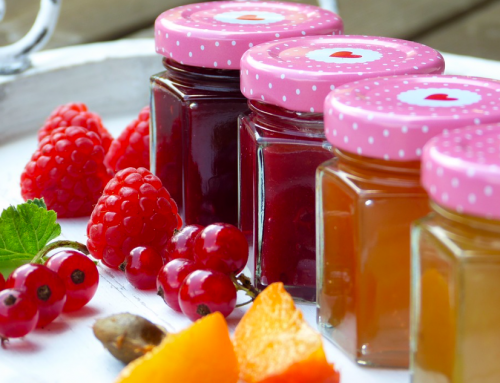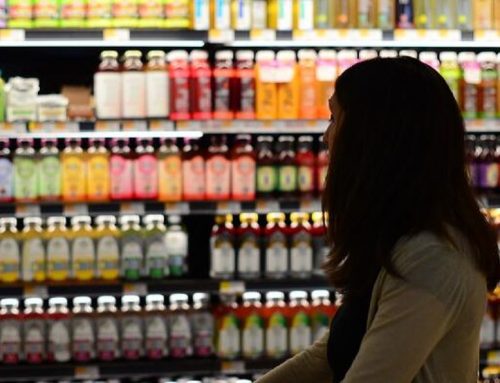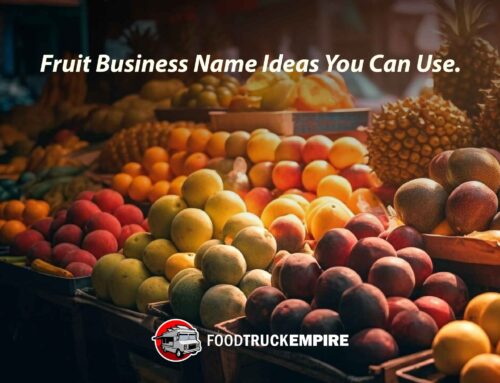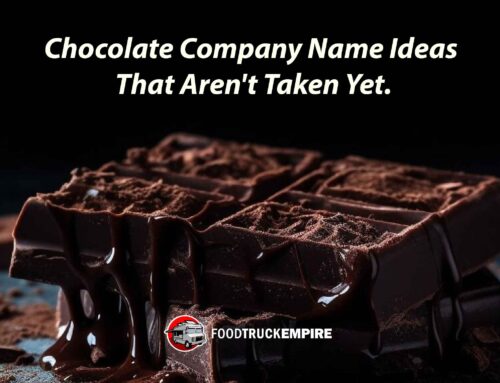I have five of them.
I’m talking about distributors. You know, the companies who take away your gross margin and you then sit there stumped wondering “where did all my money go?” Yes – those distributors. They do serve a purpose (as stated in #1 on the list below). But there is a lot more to a distributor than simply wanting to sell your products.
While all distributors aren’t evil, they do have things in common. Before you venture down the road of “low-margin, high (supposedly) volume” sales keep reading. These realities are especially important for specialty food business owners who have just started out and are looking to expand beyond farmer’s markets and a handful of local retailers.
Here we go:
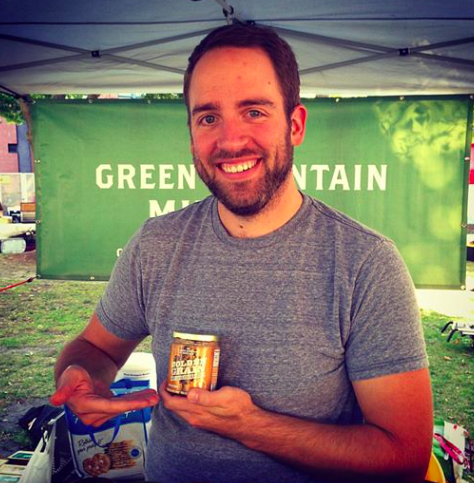
That’s me slinging mustard at a farmers market.
Page Contents
- 1. They won’t sell your product for you
- 2. Margins vary
- 3. You’ll be expected to advertise
- 4. You’ll be expected to run a promotion
- 5. You’re one product of thousands
- 6. They won’t give you a list of retailers you’re in (crazy)
- 7. They may look for you to give up your “big accounts”
- 8. Be careful with “guaranteed sale”
- 9. The process to get started takes weeks – or months
- 10. Distributors do not equal success
- Frequently Asked Questions
1. They won’t sell your product for you
During a seminar in San Francisco at the Winter Fancy Food Show, a presenter said something that has stuck with me since that eye-opening day in January: “Don’t expect a distributor to sell your product. Their sole purpose is to get your product from point A to point B. That is it.”
He was right. I recently brought on a distributor that has a sales team. But, my other distributors? It’s hard to find an employee who focuses on sales (they do exist). They are a distributor. Not a sales rep. Not a broker. Not a demo person. They get your product from point A to point B – expect nothing more. What does this mean for your company? You’ve got to help your distributor sell. That means going to their accounts and acting as your distributor’s sales rep. “You can get our product through XYZ Distributor” (Sure you can ship direct to the store, but many buyers these days want one ordering point. They want to deal with one person, not 100 direct accounts.)
Related Reading: The Pros and Cons of Hiring a Food Broker
2. Margins vary
Want to sell your product in food service containers? Distributors will take 10 – 15% margins. How about high-end retail stores? It’s closer to 25 or 30%. (Here’s an article on food product pricing). It depends on level of service and product. Plan your product’s pricing accordingly. And don’t be afraid to change your pricing — just be aware of how your price changes impact pricing through the whole distribution channel. A ten cent increase could mean an increase of $0.80 on the shelf. Know your margins before you get started distributing product through multiple channels.
3. You’ll be expected to advertise
If you read a lot about marketing, you’ll notice that advertising has fallen by the wayside — especially print — unless you’re a multi-national corporation with the advertising budget to support a large campaign. But, distributors print catalogs for their customers to browse through.
The catalog displays all product lines and highlights new products, seasonal items, etc. So, how do buyers find your items in a sea of thousands? Advertising. Half page, full page, banner, front-cover, you name it. And it all costs money. While not required, it’s highly recommended. One of the distributors I work with requires a $500 annual minimum advertising budget. While hard to quantify results, it’s the only way I’m going to get initial orders. And I can choose when to advertise — like the summer when mustard consumption is at its highest.
4. You’ll be expected to run a promotion
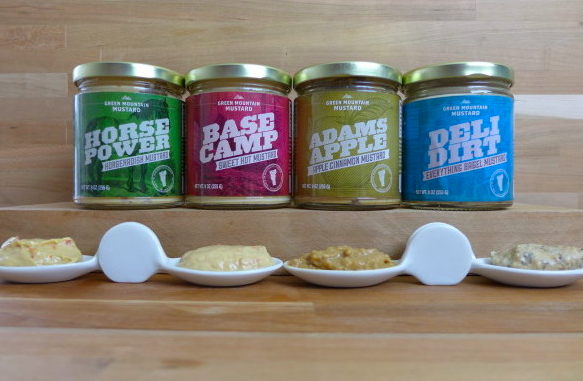
You’ll be expected to sell product at a discount.
Funny how this works. Some distributors only order when a product is on promotion. It’s called bridge buying. They’ll wait for your promotion to hit and buy up your inventory — enough to get to the next time your product is on promotion. It sounds crazy, but it happens.
You’ll eventually get stuck in these promotional cycles (some distributors – or even retailers) require your product to be on promotion for 25 weeks a year. Yes, that means half the year. This also means your margins should be strong is you’re aggressively looking to distributors to assist in growing your business. Don’t get me wrong — promotions, if run successfully, can move a lot of product. But, get used to making it one of the main ways your product moves from your warehouse (or parent’s basement in my case).
5. You’re one product of thousands
As I mentioned earlier, it’s going to be a battle for you to find your product’s footing when you’re one product of thousands. Just like you flip through the ULINE product catalog looking for packing supplies, buyers flip through catalogs to find your products. Being one of many means you have to do some research on your category. How many other relishes do they have? Do they sell other pickles? How are they packed? What’s the case price? Are they a well known brand with marketing support. Look to your category as your competition.
In my case, my distributors carry a myriad of mustards. And my product is super-premium. It has to look premium. taste different, have different flavors –or I’m just going to get passed over. Don’t get passed over. Educate your distributor on your company story, why your products are different, and what marketing support you’re willing to offer to make your product move from the retailer’s shelf.
Case Study: How to Moms Launched a Keto Cracker Company Defy Foods
6. They won’t give you a list of retailers you’re in (crazy)

Distributors won’t offer detailed sales data most of the time.
This is a mystery to me. Many distributors won’t send you sales data. They won’t tell you where your product is because they fear you’ll swoop in and steal the account back by undercutting them and shipping direct. That’s archaic, in my opinion. I have received sales data from my largest distributor and it has dramatically changed how I view my business (more on that soon). Look at a distributor as your partner.
You both want the same thing – to move more product. See if you can get sales data. It’ll help let customers know where they can find your product, you can schedule demos, and you can have a better understanding of the type of retailer buying your product.
7. They may look for you to give up your “big accounts”
Yes – you can keep your house accounts. The accounts that are so good you’d hate to give up your margin. Distributors will be fine with that. But to land the distributor – and get their interest – you may have to say “Look – I’ve got 50 accounts I’m going to give you.” That’ll get your foot in the door to more accounts and build loyalty with your new distributor. And don’t be afraid to fight to get your big accounts back – or fire your distributor. Maybe things just aren’t working out — so know who has control over your most-profitable accounts.
8. Be careful with “guaranteed sale”

Be careful with guarantees. It can be risky.
I used to think the only place I’d run into a guaranteed sale agreement was when I owned a fresh-baked energy bar company back in college. Nope – it exists with distributors. If you have a long shelf, you don’t have to worry too much. Most distributors like product to hit their warehouse when there’s 75% of the shelf-life left.
Anything after that and they’ll send it back to you at your expense (ouch!). With new products, distributors will often add a guaranteed sale to the contract that states the product ordered on the first purchase order has six months to be sold. They do this to make sure there is demand for your product — after all, the product they keep in stock is just tied up cash. If it doesn’t sell, it’s going back to you.
9. The process to get started takes weeks – or months
You’re not the only new product this month. There are probably 10-20 new products being introduced. That means the new products manager is swamped with paperwork, politics, and other employees not doing what they’re supposed to do. This pro-longs the process into weeks or even months. Then, when all the paperwork is completed, you may not launch for another month or two. For example, it took me 4 months to get a PO from my latest distributor — just part of the business!
Attention Founders: Download our food business startup kit with business canvas, startup spreadsheets, and exclusive interviews.
10. Distributors do not equal success
I used to think that landing a distributor was the key to rapid growth for my mustard company. It isn’t. It’s just another transportation company that I hired and decided to give them a 25% margin to bring my product to retailers. It’s a business decision. And more distributors isn’t going to solve the problem. You are going to have to work with your distributors as if they are integral to your success — it’s not a “set it and forget it” relationship. You still have to build relationships with retailers regardless of who does the delivery.
Working with distributors is just one way to grow your food business. And I wanted to highlight that it isn’t the easiest. It just requires a lot more work for the lower margins. But the hope is that low margins are balanced with high volume. The only way to find out is to start working with one!
Frequently Asked Questions
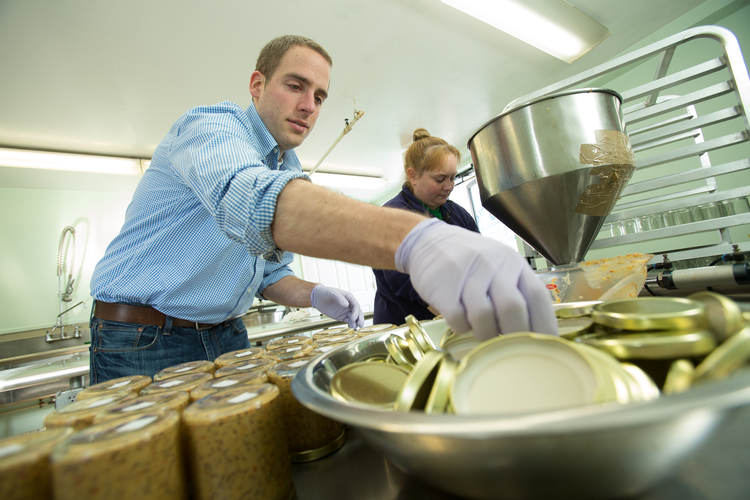
Yes… that’s really me on the production floor bottling mustard.
Do you have any lessons learned from your experiences working with distributors? Share them in the comments below. I’d love to hear them. Here are some conversations around this subject happening in our premium community. I thought sharing some of these questions and along with my responses would be helpful.
Question: You didn’t mention the variation in how long it takes for distributors to pay. We are only working with one distributor currently and haven’t had any problems but other food producers have shared less positive experiences. Any thoughts on this aspect of the relationship?
Answer: Yes – very true. Getting paid. How could I forget that? I think it’s important to work with your distributor as equals. Communicate the money they are holding is important for you to get more product produced so you can fill their next order…..I haven’t had too many problems to date — couple of Net 45 or Net 60, but nothing that has crippled my business. (Knock on wood).
Attention Founders: Get a New Food Business Case Study Delivered To Your Inbox Each Week for Free
Question: Are there any positives to working with a distributor? Honestly I read this as reasons to NOT work with distributors. I don’t think that was your intention at all, it is just how I read it. I had assumed that having distributors would help us grow without us having to do all of the work but it seems like I was incorrect.
Answer: Yes, there are positives. For one, distribution gets taken care of and you’re not schlepping product around to tons of retailers (it’s more efficient with a distributor). Another one, which related to that is you’re focused on generating and filling one large order, rather than small ones. And finally (there are other reasons), you get access to their relationships, established accounts, and structure. You want to grow with them, but expect to put in the leg work.

Question: Any suggestions for products that have limited shelf life (like Snarf Foods) because we don’t use added preservatives? That guaranteed sale thing has me freaked out!
Answer: Don’t feel overwhelmed. You may not even run into guaranteed sale, but it is possibility. When I ran my energy bar company I did it to get into retailers, but factored it into my pricing, too. And my one strategy suggestion would be to focus on a core of retailers that turn through your product quickly, rather than many retailers who you’re unable to manage (which results in spoiled product).
Question: When you approach a local retailer do you usually take a separate sample for them to taste. My product is 1/2 lb and I’m thinking of them tasting a small piece and being left with the rest. If I do this over and over again the cost can add up. So what is the proper way to go and is there a way to keep the cost down?
Answer: You want to give them a full, packaged sample to keep. Then for tasting, I’d crush/crack up the 8 oz and bring a container of little pieces with you. My friend owns a toffee company and she does that with her toffee – works well.
Question: I have a gluten-free company and I am thinking of using a distributor. They sent me a new product information sheet and I am lost. It has Manufacturer Charge back- what is that? Sales Broker Agency – does everyone need a sales broker.
Answer: Manufacturer’s Charge Backs (aka MCB’s) are for promotions you run or samples they sample out, or splitting cases. You will want to keep an eye on these! You can have a discussion to see what your distributor considers an MCB. You don’t need a broker, but sometimes distributors want to know if there is going to be someone else out there selling for you — you can just leave that blank.
Question: I want to open the market for the ACAI Berry, we are one of the biggest producer/manufacturer and I was reading a lot of articles about distribution and sales to the big chains, but noticed that the big ones are using EDI and if I am looking to expand not regional but nationwide, what would be the suggestion? Hire a Broker or a Distributor that covers from sales to delivery. Another thing is for the supermarkets need to hire for tasting sessions, do you think that they offer that as well or is a third party company that I need to hire?
Answer: It would be best to hire a national broker team who can help you across the entire supply chain. In terms of in-store demos, many companies use their own employees you can pay or they can suggest 3rd party demo services — they run anywhere from $100 – $200 / demo / day. Good luck!

